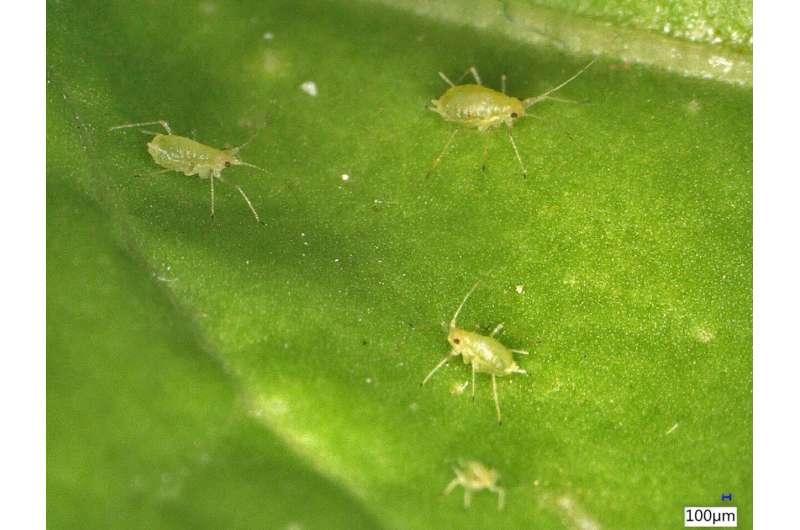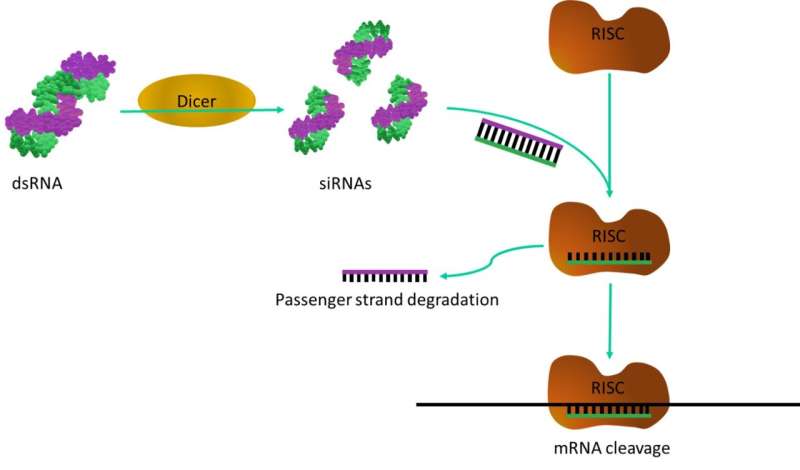This article has been reviewed according to Science X's editorial process and policies. Editors have highlighted the following attributes while ensuring the content's credibility:
fact-checked
trusted source
proofread
Targeted pest control with RNA spray

Protecting plants efficiently against pests without harming other organisms—this is the objective of the joint research project ViVe_Beet, which is coordinated by the Julius Kühn Institute (JKI). Scientists from the JKI Institute for Plant Protection in Field Crops and Grassland, the Fraunhofer Institute for Molecular Biology and Applied Ecology IME and the Institute of Sugar Beet Research (IfZ) are involved in the project.
The strategy adopted by the project partners involves the use of customized double-stranded RNA molecules, incorporated into a suitable formulation. This formulation is then applied through conventional application methods to protect sugar beets from yellowing viruses in the future.
Application of synthetic chemical insecticides and pesticides in agriculture has a negative impact on insect diversity and bee health. To avoid such harm, the EU phased out approval of systemically effective neonicotinoids in 2019. However, this has led to new issues in agriculture, particularly because green peach aphids (Myzus persicae), among the insects displaying high resistance to synthetic chemical insecticides, have proven exceptionally challenging to manage.
These aphids transmit several yellowing viruses—affecting sugar beets in particular—leading to enormous losses in sugar beet harvests. "We're actually speaking of a 20% to 50% loss in yield due to the viruses alone," says Maurice Pierry who has been supporting the ViVe_Beet project at the Fraunhofer IME Bioresources branch in Gießen from the start.
New approach to pest control: RNA interference (RNAi)
The scale of the issue means that new approaches are urgently required to ensure sustainable and efficient control of the aphids. Fraunhofer IME and its project partners JKI and IfZ have chosen a biological, species-specific approach and are working together to control these aphids with the help of RNA interference (RNAi).

RNAi is a natural immune response of the hosts to the foreign genetic material of viruses, which is often present in the form of double-stranded RNA (dsRNA). Pierry explains, "Viruses have genetic material in the form of RNA. When RNA enters the cell of a living being (i.e., an insect in our case), an enzyme called 'Dicer' chops it into smaller segments known as small interfering RNA (siRNA).
"They are then incorporated into the RNA induced silencing complex (RISC) and used as a template to degrade matching mRNA sequences. If we select these dsRNAs so that they match a crucial gene of the insect, you can induce the organism to control itself effectively via its own RNAi system."
From lab tests to the field
At the start of the project, which is scheduled from October 2021 to September 2024, potentially effective genes and their base sequences had to be identified. This was followed by biological methods to produce dsRNA specifically adapted to these base sequences. Pierry states, "To start with, we had to identify a gene that has an effect when silenced with the RNA interference mechanism. Effects vary from molting problems and a drop in offspring to increased mortality of the pests. After conducting a number of tests, we managed to identify several genes that cause high mortality in the aphids when silenced. This was the first major milestone."
In a second step, the Fraunhofer IME scientists had to create a formulation that would protect the double-stranded RNA molecule from environmental factors such as temperature, humidity, UV rays and RNA-degrading enzymes until it reaches its destination, e.g., in the aphids' intestines, where it is absorbed by the cell. "We have also been successful in this area. This means that our dsRNA is protected by a formulation that boosts the effect and has prolonged longevity," says Pierry.
In the meantime, the researchers have embarked on the third step: The first spray trials directly on the target plant. "We have developed an RNA spray method and tested it in greenhouse spray trials. So far, we have achieved a mortality rate of 70% and a reduction in population size. These are great results," says Pierry.
The final step will involve field trials including all previously excluded environmental factors. These will be carried out by JKI and the IfZ next summer.
Selective plant protection agents are harmless to other organisms
The innovative approach of the ViVe_Beet project can potentially lead to the development of new, environmentally friendly, selective plant protection agents, as the specific and natural molecules can be used not only to control insects but also viruses or fungi.
"This method is special as the specifically adapted dsRNA affects the target organism, in this case, the green peach aphids, but no other organisms such as humans or beneficial insects like bees," says Pierry.
This new method of pest control raises hope for sustainable plant protection and has a high potential for future applications.
Provided by Fraunhofer-Gesellschaft




















